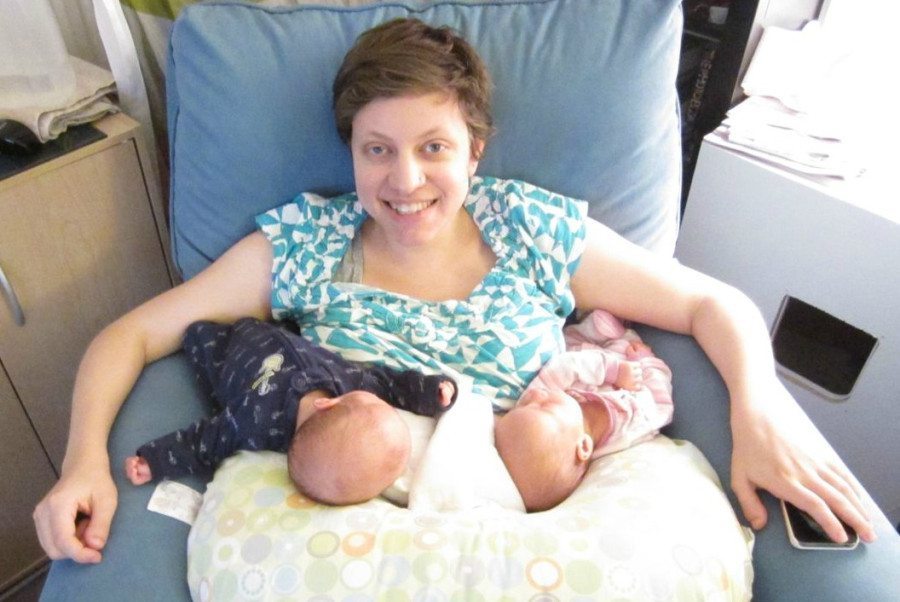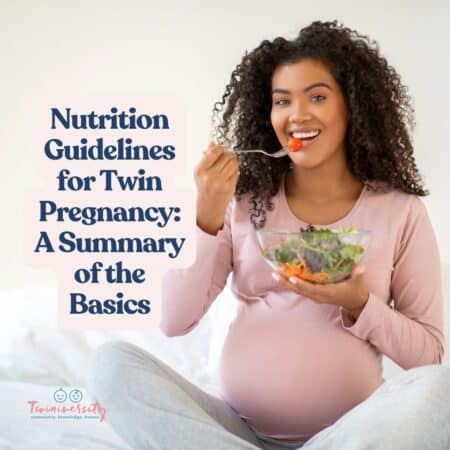Last updated on February 5th, 2024 at 04:55 pm
Having experienced depression and anxiety in my life, I thought I would know what postpartum depression looked like. I thought I would know what it would be like if and when it happened, and I thought I would, of course, get help at the first whiff of trouble. But it wasn’t that simple.
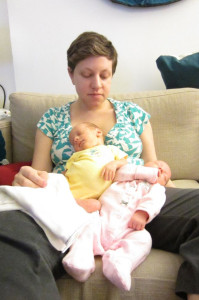
In the weeks after the babies were born, I was on the lookout for all the signs. I felt overwhelmed – check! I cried a lot – check! I was anxious and frustrated – check! Oh man, better get a therapist right away! Three weeks after the babies were born I had an appointment with a therapist because I was sure this was PPD. But that appointment didn’t work out, my sense of time was off, and I showed up a day late. And instead of rescheduling I decided I was probably fine. I think I was, actually. That is, besides not knowing what day of the week it was.
I was having trouble breastfeeding. I was pumping around the clock and had the babies at the breast at least every 3 hours, sometimes more. But it just wasn’t working. I didn’t have enough milk. I saw lactation consultants and went to breastfeeding support groups but I just couldn’t make enough milk for the kids to be full. I almost always supplemented with a bottle. Trying to get through a feeding without supplementing with a bottle was my goal, and it was in retrospect unfair to put that pressure on myself. But I wanted to breastfeed.
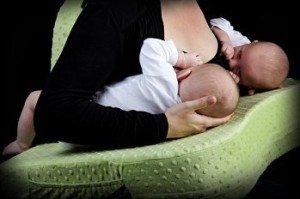
One of the lactation consultants told me that my medical conditions were probably affecting my milk production. I have both Polycystic Ovarian Syndrome (PCOS) and was on thyroid medication while pregnant. But I had my thyroid checked after the babies were born and the doctor said I could go off the medication, and shouldn’t my PCOS be moot so soon after birth and while I was breastfeeding?
At four months I gave up breast feeding. It was so hard. The milk was not increasing, I had reached a major plateau, and every single meal was at least half-breast/half-bottle. Meals were taking 90 minutes because of all the prep involved in tandem breastfeeding and tandem bottle feeding — the entire time the kids were awake! I was crying when they needed a bottle after all the work. I gave up. I’m done. The first time I gave them bottles instead of even trying to breastfeed, I was sobbing.
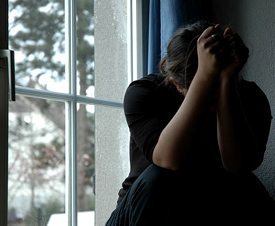
Then I just kind of started sobbing at other times, too.
I felt inadequate as a mother. I had failed. Not only had I failed, but HOW could it be possible that while I was breastfeeding twins and walking for an hour almost every day (they would only nap in the stroller), I was gaining a pound a week. I was almost at my 34 week gestation pre-delivery weight! With no babies in my body!
The weight kept going up up up. I considered it another failure. A failure to take care of myself, let alone the children.
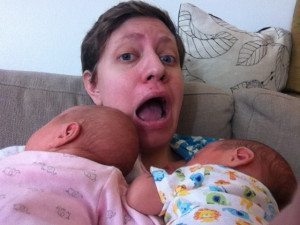
Any time the babies cried I took it as a failing mark on a report card. Good mothers’ children don’t cry because good mothers know what their children need. Good mothers are patient. Good mothers are prepared for every situation no matter how obscure. Good mothers don’t shout at their infants to be quiet. Good mothers don’t stare into space. Good mothers don’t hide in the laundry room plugging their ears because they can’t-take-the-crying-for-one-more-second-or-else-I-don’t-know-what-I’m-going-to-do.
I don’t know how many weeks it took before I realized that I needed help but it was several weeks. I had been (relatively) fine until the kids were 4 months old, so it couldn’t possibly be PPD. This was just me, obviously failing as a mother and a human being.

I started seeing a therapist who came to my home. At the same time I had another follow-up appointment with my endocrinologist.
Two things happened.
First, I found out my thyroid had completely stopped working. Even though it was fine after the babies were born, it stopped working, probably around the time I stopped breastfeeding because my supply had plateaued.
But also, thyroid issues can start months after birth and cause depression, breastfeeding difficulty, and weight gain. I started hormone replacement therapy and immediately started feeling better and losing weight.
Second, I found out that postpartum depression doesn’t always happen immediately after birth. You can be fine for a while and then suddenly not be fine.

My kids are almost two and I am still taking full hormone replacement, and probably will for the rest of my life. My weight is much lower than before but still not pre-baby, and that is (mostly) okay with me. My mental health is much better. I know there are bad days and there are good days, but most days are good ones.
I thought I would be more in tune with myself and be able to recognize my emotional distress early. The thing is, having twins is as hard as it is wonderful. But it’s really impossible to know what it will be like until it happens.
I am fortunate to have my husband and support system. I am fortunate that I was able to get help when I was in my worst moments. And I am so so grateful that I am still here, still mommy to my little monkeys, and that our family bond has survived that stormy time.
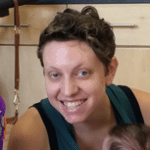
Robin Sheldon is an artist and therapist, currently staying at home full time with her big kid twins, new baby, and two cats while her husband hunts and gathers. According to her children, her job is making breakfast and packing lunches, what makes her happy is hugs, and her favorite food is cookies. Pretty accurate!

